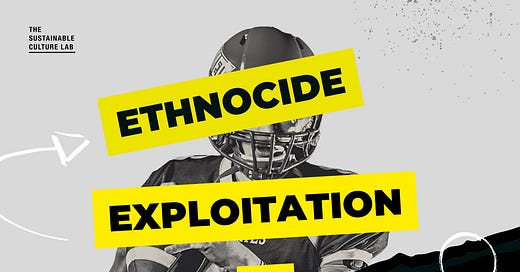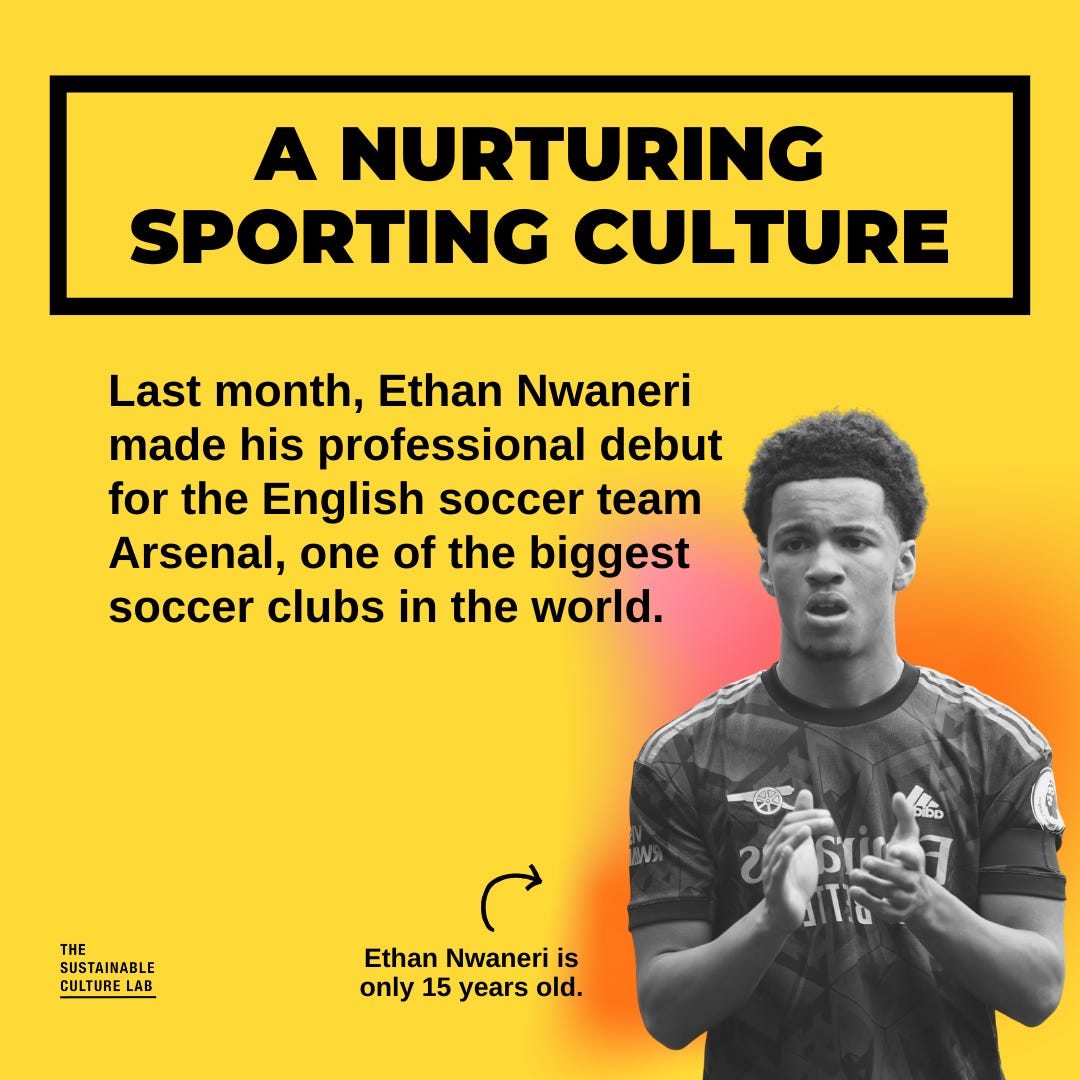Last week, I attended the screening for my good friend Craig Martin’s show The Good Road that airs on PBS, and during the socializing that happens at these events, I got into a long discussion about how American sports are ethnocidal.
For those of you who don’t know, when I’m not engaging in my work at SCL, teaching at GW, working on my next book, or writing articles, I spend a lot of time watching and reading about sports, especially soccer and basketball. My near-obsession with sports may seem like a distraction, but I actually consider it to be an extension of my philosophical work.
To succeed at a sport, you need to have a philosophy. Coaches, players, and team owners need to have a philosophy that they believe will win games and generate revenue, and the effectiveness of this philosophy gets tested every single match.
SCL The Word is a reader-supported publication. To receive new posts and support my work, consider becoming a free or paid subscriber.
I enjoy watching sports because I view it as a clash of philosophies. Two philosophies come into contact each game, yet the only punishment for the losers is the sting of defeat. No one dies or goes to jail, and the defeated now have the opportunity to learn from the philosophy that defeated them so that they can become better the next time.
The philosophies you see in sport are also heavily influenced by place, and the culture of that place. For example, as a child, I became fascinated by the fact that different countries played soccer in different ways. The Germans had their own style, as did the Dutch, French, Spanish, and Italians. This might seem like an obvious observation, but the rules of soccer are the same for everyone, yet some inexplicable cultural characteristics inclined all of these countries to play the same game differently.
For me, sports are a combination of culture and philosophy with the additional clarity to distinguish between good and bad. A good philosophy that derives from a nurturing culture will win more matches than it loses, and a bad one will lose more matches than it wins.
Sports are a philosophy in action. This is why I love sports, and also why American sports are so frustrating to me, regardless of how entertaining or spectacular they may be. America’s ethnocidal culture and philosophy make us worse at sports.
To help sustain and grow The Word with Barrett Holmes Pitner we have introduced a subscription option to the newsletter. Subscribers will allow us to continue producing The Word, and create exciting new content including podcasts and new newsletters.
Subscriptions start at $5 a month, and if you would like to give more you can sign up as a Founding Member and name your price.We really enjoy bringing you The Word each week and we thank you for supporting our work.
A System of Exploitation
As we have reviewed in this newsletter before, an ethnocidal society exists to destroy a people’s culture while keeping the people. Building on this, one of the first questions you might naturally ask once you recognize ethnocide is, “Why do they want to keep the people?”
The answer to this question is pretty simple, but one must still ask the question so that our understanding of ethnocide is no longer merely theoretical and we are now talking about the actual historical and contemporary implementations of ethnocide. In America, and many other countries, ethnocide was used to create a class of people who existed within a society to be exploited in perpetuity.
American chattel slavery encouraged many Americans to create “businesses” where the idea of paying your “workers” was considered absurd. Additionally, the idea of providing nurturing and sustainable services such as established work hours, education, healthcare, vacations, or retirement plans was never even considered. This created a “business” culture where some people were forced to work themselves to death, so that their “boss” could have a comfortable, affluent life.
The United States has clearly moved beyond the brutality of chattel slavery, but we still embrace exploitative business and cultural norms. One of the reasons for this culture of exploitation is that in order for America to have originally embraced chattel slavery, we needed language that would articulate why systemic exploitation was a cultural necessity.
Many Americans may not have approved of the horrors of slavery, while also simultaneously embracing the products and wealth generated by the labor of enslaved people in the South. The Electoral College and the three-fifths compromise are examples of the power the Southern states possessed at the founding of the United States due to the wealth generated by slavery despite the North’s opposition to slavery.
Slavery ended a long time ago, but just like the Electoral College, a system of exploitation still remains.
American exploitation is very peculiar because, since Americans have always lived within an exploitative society, we do not consider exploitation to actually be exploitation when we see it. Instead, we are more prone to describe exploitation as an unavoidable norm—that’s “just the way things are,” or “it’s part of human nature”—and then highlight how things could be worse and that we should be thankful that we are not being exploited as badly as other Americans. We embrace our exploitation because we know we could be exploited even more.
For example, poor white people in the South have been exploited by rich white people in the South since American colonization, but these poor whites rarely united in solidarity with enslaved Black Americans to defeat the rich landowners. They did not unite with Black Americans because doing so had the potential to make them become Black, and now their exploitation and oppression would increase exponentially. Essentially, they made peace with a lifetime of exploitation because they knew there was a worse option.
This dynamic of comparative exploitation instead of freedom from exploitation is prevalent throughout American society. It crosses racial divides despite there being clear racial overtones. And American sports provide an unmistakable microcosm of this systemic problem, yet to clearly see it you must be aware of the sporting philosophies implemented in other countries.
A Nurturing Sporting Culture
I can talk for a very long time about the nurturing sporting philosophies and cultures that exist outside of the United States, but for this newsletter I am going to focus on the story of a young man named Ethan Nwaneri.
Last month, Nwaneri made his professional debut for the English soccer team Arsenal. Nwaneri was only 15-years-old when he made his debut, making him the youngest debutant in the history of the English Premier League. This was obviously a massive occasion for Nwaneri, but it was also a big deal for the entire soccer club and especially the young kids in Arsenal’s academy.
Also, another wonderful aspect of Nwaneri’s debut is that some of the professional players help out and coach the younger teams, so when he was promoted to the top team he already had senior players who knew him and believed in him.
Here’s a great video that Arsenal produced to demonstrate the importance of Nwaneri’s milestone.
For the casual soccer fan, Nwaneri’s debut was interesting, but not of much significance. However, for American sport fans it should further highlight the glaring inefficiencies of American sports due to our ethnocidal norms.
Arsenal Football Club is one of the biggest soccer clubs in the world, and I have been an avid supporter of the team for most of my life, and like almost every sports club outside of the United States it has an academy that exists to nurture and coach players so that they can hopefully play for the top team.
For example, if a system like this existed in the NBA, LeBron James would have never played high school basketball, skipped college basketball, and then gotten drafted by the Cleveland Cavaliers. Instead, James, who is from Akron, Ohio, would have started playing basketball in the Cleveland Cavaliers academy when he was probably 9 or 10 years old.
At that young age, the academy coaches would have nurtured his talent to the best of their abilities, so that the NBA team could have the best possible talent. His coaches would have been mostly former and current NBA players. Judging by James’ immense talent, he probably would have been practicing with NBA players by the time he was 15, and he may have even made his NBA debut around the same age as Nwaneri. Obviously, James would not have been the star of the team at 15, but that experience would help him mature and get ready for the pressures of the NBA.
By the time he was 16 or 17 years old, James may have already been starting for the Cavaliers in the NBA. He would not merely be a kid from Akron who made it out. He would be a kid that Cleveland nurtured and worked to turn him into the best athlete and person he could be.
When I talk to Americans about the culture and philosophy of sport youth systems and academies in other countries, they always ask about the child’s education and the cost of these programs.
When the children are in these academies, they still have to attend school until they sign their first professional contract, which can happen as early as 16 years old. These academies are like playing club sports but with a much clearer and effective pathway to the pros.
The academies are totally free because the cost of developing a player from scratch is less expensive than the millions of dollars it costs to buy a player from another club. Additionally, having a hometown kid play for the team is a great story that excites fans and makes kids dream about playing for their hometown team.
Also, there are all sorts of laws in place to ensure that the clubs do not take advantage of the children.
For example, when Nwaneri made his debut he had to change alone in the dressing room because he was too young to be in a changing room with grown men. Also, a couple of years ago, a 16-year-old Spanish player named Ansu Fati had to get permission from his parents to play a night match for F.C Barcelona because it was too late for a youth to work.
In contrast, American sports are a system where the child’s family has to pay for their athletics, and there is very little chance that they will ever become a professional. And if they do make it to the pros, it is rare that they will ever play for their hometown team. These athletes also never get paid for playing high school or college sports despite making millions for these institutions. And then when they do go pro, they have very little control over the team that they play for.
American sports are an individualistic, exploitative culture that does not nurture athletes, but makes sport team owners and universities billions of dollars. Yet our society largely condones this exploitation because a select few get to be millionaires. We condone the exploitation because becoming a millionaire professional athlete appears to offer a path out of America’s exploitative ethnocidal society, yet the exploitative system still remains.
American sports, and our entire society, could be so much better if our culture nurtured instead of exploited Americans.






